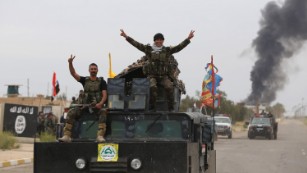In explaining why Iraqi forces were not equipped more quickly, Carter said the process was “sometimes delayed by bureaucracy in Baghdad, but occasionally also in Washington.”
“That is why we are now expediting delivery of essential equipment and material, like anti-tank capabilities and counter-IED equipment, to the Iraqi security forces — including Kurdish and Sunni tribal forces,” Carter said.
Carter also said that the U.S. has not been receiving the help it needs from the Iraqi government,repeating a critique he made last month that Iraqi forces showed “no will to fight” during the fall of Ramadi to ISIS forces.
Dempsey, who is retiring shortly, said that a number of factors, including the various regional governments struggling to establish legitimacy, have contributed to the instability which has slowly dragged the U.S. back into the Iraq conflict.
But, Dempsey said, “Enduring stability cannot be imposed from the outside in. Stability must be cultivated from the inside out.”
‘Are we winning?’
Carter addressed what would happen if a “multi-sectarian Iraq” — a country where Sunnis, Shiites and Kurds live together — is not possible.
“If that government can’t do what it’s supposed to do, then we will still try to enable local ground forces, if they’re willing to partner with us, to keep stability in Iraq,” he said. “But there will not be a single state of Iraq.”
At one point, an exchange between Dempsey and Minnesota Republican Rep. John Kline became contentious over the situation.
“Where are we in Iraq today?” Kline asked. “Are we winning? Are we losing? Is it a stalemate? Is it a quagmire? What is Iraq today?”
A testy Dempsey pushed back against what he said was the congressman’s use of “the personal pronoun ‘we,'” saying it was up to the Iraqis, not the U.S., to prevail in the country.
“This has to be them, right? So if you’re asking, ‘Is the United States winning?’ that’s the wrong question,” the general replied.
He went on to highlight the “lily pad” strategy announced last week that could require opening multiple outposts at Iraqi bases near the front lines to build what he said Wednesday would be “a network of regional stakeholders to confront this threat, because, frankly, that’s the only way it will be resolved.”
Kline, however, was unconvinced.
“We really don’t have a strategy. You’ve articulated a piece of what would be sort of a strategy,” he said.
Washington Rep. Adam Smith, the panel’s top Democrat, asked aloud if a unified Iraq was still salvageable.
“The cow has left the barn,” Smith said. “You can make a pretty powerful argument that Iraq is no more.”
At one point, a protester who affiliated herself with Code Pink interrupted the proceedings.
“We need a political solution,” she shouted. “Not a military solution.”
As reported by CNN

